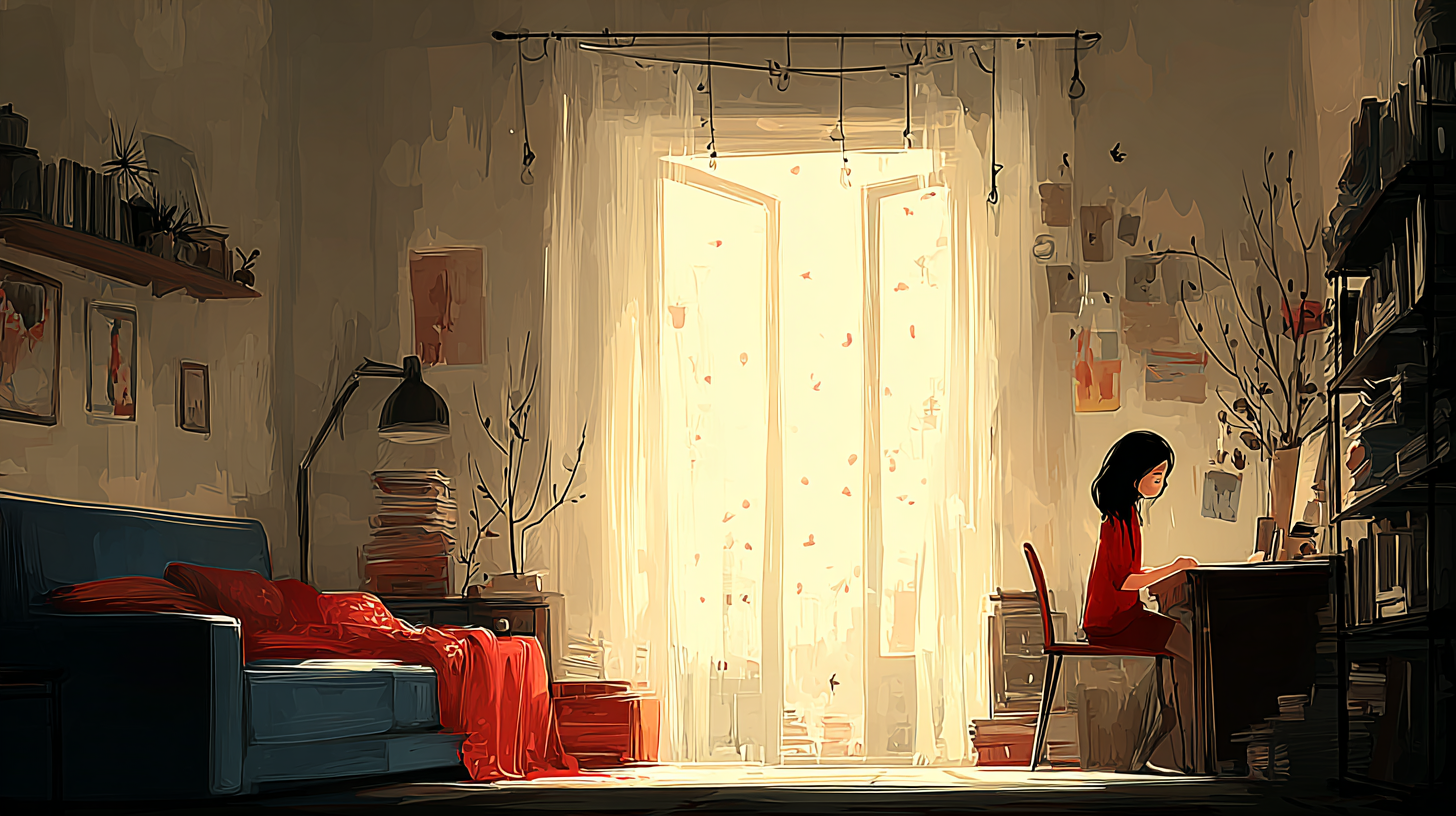“Room” means a place like a bedroom or space to move or put something.
「room」は「へや」や「すきま」のことです。
以下は英単語 “room” に関するストーリー型学習コンテンツです。まずは大枠の意味を理解して最後の文章で確認しましょう。
主な意味(main meaning)
| 品詞 | 意味 | 発音記号 | 例文 |
|---|---|---|---|
| 名詞 | 部屋、空間、余地 | /ruːm/ または /rʊm/ | She cleaned her room before her guests arrived. |
| 動詞 | (まれ)部屋を提供する、一緒に住む | /ruːm/ または /rʊm/ | They roomed together during college. |
語源(etymology)
「room」は古英語 rum(広い場所、空間)に由来し、「広がり」や「余地」が元のイメージです。
類義語(synonyms)
| 類義語 | 例文 |
|---|---|
| space | There isn’t enough space for a sofa in this room. |
| area | The area near the window gets the most sunlight. |
| chamber | The king slept in a large chamber. |
| accommodation | The hotel offers accommodation for up to 200 guests. |
反義語(antonyms)
| 反義語 | 例文 |
|---|---|
| crowding | There was crowding in the hallway during the fire drill. |
| blockage | A blockage in the hallway made it hard to move around. |
コロケーション(collocations)
| コロケーション | 例文 |
|---|---|
| hotel room | We booked a hotel room for two nights. |
| make room | Please make room for one more chair. |
| spare room | There’s a spare room you can sleep in. |
| living room | We watched a movie in the living room. |
| room to grow | This company has room to grow in the market. |
2項表現(binomials)
| 2項表現 | 例文 |
|---|---|
| room and board | The college provides room and board to students. |
| space and room | There’s enough space and room for everyone. |
英語ストーリー(english story)
Title: A New Room for Emma
Emma had just moved to a new city for her first job at a small design company. She found a small apartment and rented a room from an older woman named Mrs. Allen. The room was simple, but there was enough space for a bed, a desk, and a bookshelf.
Her living room was shared, but she was allowed to decorate her own room. Emma wanted to make it her own, so she asked Mrs. Allen, “Can I move some things and make room for a small sofa?” Mrs. Allen smiled and said, “Of course, this is your space too.”
Emma went to a furniture store and found a small blue sofa that would fit perfectly. The store assistant told her, “It’s great for small areas like yours.” That evening, she moved her bed closer to the wall to make room for the sofa.
One of her coworkers, Jason, helped her carry it in. “Your accommodation looks nice,” he said. “Do you have a spare room for guests?” Emma laughed, “No, but you’re welcome to sit in my living room anytime.”
As she looked around her new place, she felt there was plenty of room to grow. She had a job she enjoyed, new friends, and a cozy room she could call her own.
和訳
タイトル:エマの新しい部屋
エマは新しい仕事のため、小さなデザイン会社のある街に引っ越してきた。彼女はアパートの一室を借りて、年配の女性ミセス・アレンと暮らすことになった。**部屋(room)はシンプルだったが、ベッドと机、本棚を置くには十分な空間(space)**があった。
**リビングルーム(living room)は共有だったが、自分の部屋は好きなように飾っていいと言われた。エマは「少し家具を動かして、小さなソファを置くスペース(make room)を作ってもいいですか?」と聞いた。ミセス・アレンは笑顔で「もちろんよ。ここはあなたの空間(space)**でもあるのだから」と答えた。
彼女は家具店で、ちょうどよい青いソファを見つけた。店員は「こういう小さな**エリア(area)**にぴったりですよ」と言った。その日の夕方、彼女はベッドを壁際に寄せて、ソファを置くスペースを作った。
同僚のジェイソンが運ぶのを手伝ってくれた。「いい**住まい(accommodation)**だね」と彼は言った。「**予備の部屋(spare room)**はあるの?」エマは笑って「ないけど、**リビングルーム(living room)**でくつろいでいいよ」と答えた。
自分の新しい部屋を見回しながら、エマは「ここにはまだまだ**成長の余地(room to grow)**がある」と感じた。楽しい仕事、新しい友達、そして「自分の部屋」があるのだ。
Q&A
「room」と「space」の違いは?
「room」は物理的な「部屋」や「空きスペース」を指すことが多く、具体的です。一方「space」は「空間」全般を意味し、より抽象的で、屋外や宇宙のような広い意味にも使えます。
例:
- There’s no room for another chair in this car.(この車には椅子をもう一つ置く余地がない)
- I need more space to think.(もっと考えるための空間が必要だ)
「room」と「area」の違いは?
「room」は建物の中にある「部屋」や「余地」、一方「area」は特定の「範囲」や「区域」で、屋内外問わず使えます。
例:
- The kitchen is a room.(キッチンは部屋です)
- This area is for staff only.(この区域はスタッフ専用です)
「room」と「chamber」の違いは?
「chamber」は格式ある「部屋」や、特別な目的のための部屋(会議室、裁判所の部屋など)に使われ、「room」より堅い表現です。
例:
- The judge entered the chamber.(裁判官が判事室に入った)
- He cleaned his room.(彼は部屋を掃除した)
「room」と「accommodation」の違いは?
「room」は単体の「部屋」や「余地」、一方「accommodation」は「宿泊施設」や「住むための環境」全体を指し、ホテルや下宿などにも使われます。
例:
- I reserved a room at the hotel.(ホテルの部屋を予約した)
- The hotel offers accommodation and meals.(そのホテルは宿泊施設と食事を提供している)
「room」と「crowding」の違いは?
「room」は空きがある状態、「crowding」は「混雑」や「密集」状態を指し、対照的な概念です。
例:
- There’s not enough room to move.(動く余地がない)
- The station was full of crowding during rush hour.(ラッシュアワーの駅は混雑していた)
「room」と「blockage」の違いは?
「room」は空きやスペースを意味し、「blockage」は通路などを「ふさいでいるもの」「障害物」です。
例:
- Make some room for the new sofa.(新しいソファのスペースを作ろう)
- There was a blockage in the hallway.(廊下に障害物があった)
「make room」と「room」の違いは?
「room」は名詞、「make room」は動詞句で「スペースを作る」「場所を空ける」という意味になります。
例:
- There is room for improvement.(改善の余地がある)
- Please make room for others.(他の人のためにスペースを空けてください)
「living room」と「room」の違いは?
「living room」は家の中の「居間」、リラックスや家族団らんの場を指します。「room」はより一般的で、どんな種類の部屋にも使われます。
例:
- I’m in my living room watching TV.(私は居間でテレビを見ている)
- She went to her room to study.(彼女は勉強するために自分の部屋に行った)
「room to grow」と「room」の違いは?
「room to grow」は比喩表現で、「成長の余地」「可能性の幅」という意味になります。物理的な空間ではなく、能力や事業の発展性を指します。
例:
- Our company has room to grow.(私たちの会社には成長の余地がある)
「room and board」と「room」の違いは?
「room and board」は「宿と食事がセットになった滞在」の意味。「room」は部屋だけを指します。
例:
- The dorm fee includes room and board.(寮の料金には部屋と食事が含まれている)



コメント